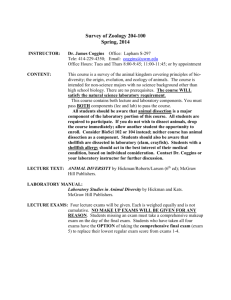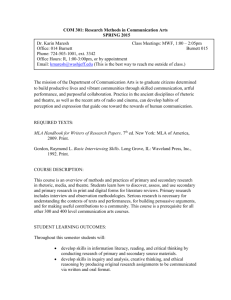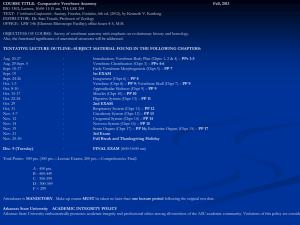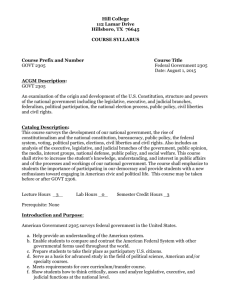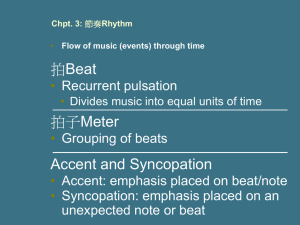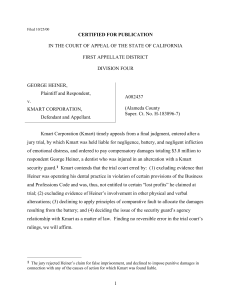Soc 330 Social Deviance - J Whitley
advertisement
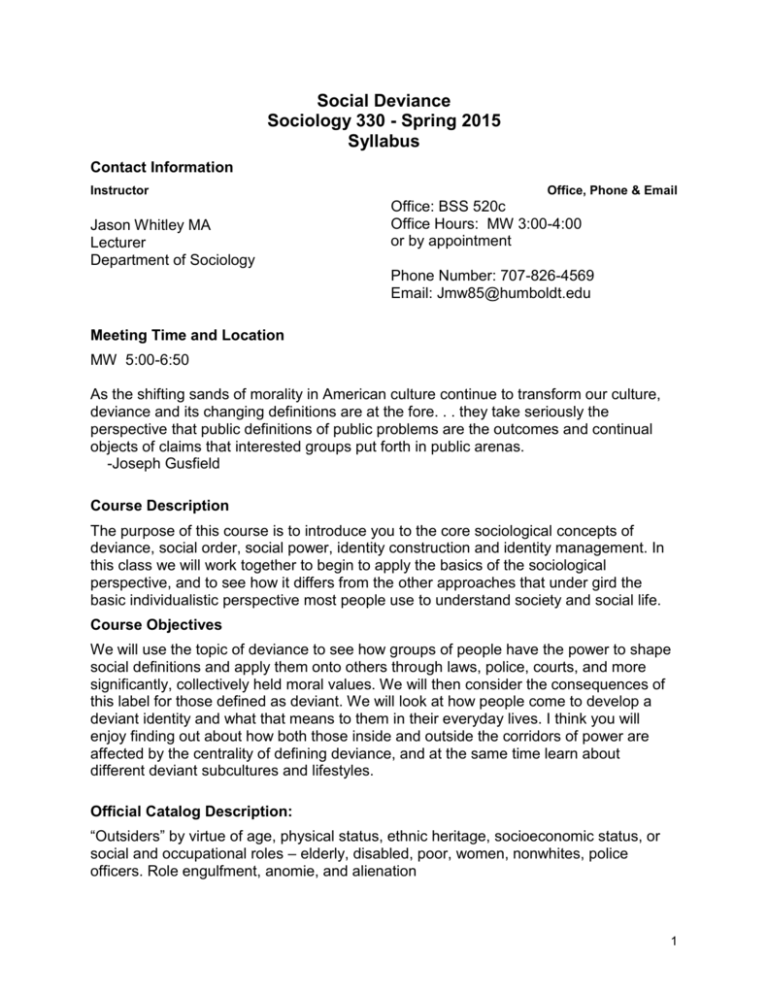
Social Deviance Sociology 330 - Spring 2015 Syllabus Contact Information Instructor Jason Whitley MA Lecturer Department of Sociology Office, Phone & Email Office: BSS 520c Office Hours: MW 3:00-4:00 or by appointment Phone Number: 707-826-4569 Email: Jmw85@humboldt.edu Meeting Time and Location MW 5:00-6:50 As the shifting sands of morality in American culture continue to transform our culture, deviance and its changing definitions are at the fore. . . they take seriously the perspective that public definitions of public problems are the outcomes and continual objects of claims that interested groups put forth in public arenas. -Joseph Gusfield Course Description The purpose of this course is to introduce you to the core sociological concepts of deviance, social order, social power, identity construction and identity management. In this class we will work together to begin to apply the basics of the sociological perspective, and to see how it differs from the other approaches that under gird the basic individualistic perspective most people use to understand society and social life. Course Objectives We will use the topic of deviance to see how groups of people have the power to shape social definitions and apply them onto others through laws, police, courts, and more significantly, collectively held moral values. We will then consider the consequences of this label for those defined as deviant. We will look at how people come to develop a deviant identity and what that means to them in their everyday lives. I think you will enjoy finding out about how both those inside and outside the corridors of power are affected by the centrality of defining deviance, and at the same time learn about different deviant subcultures and lifestyles. Official Catalog Description: “Outsiders” by virtue of age, physical status, ethnic heritage, socioeconomic status, or social and occupational roles – elderly, disabled, poor, women, nonwhites, police officers. Role engulfment, anomie, and alienation 1 Learning Outcomes The following learning outcomes are course, Department and University specific: Course By the end of the semester, students should be able to: 1. Demonstrate an understanding of the relativist perspective of deviance 2. Identify the relationship between theories of deviance and existing research 3. Articulate the ethical and methodological issues associated with researching deviant behavior 4. Communicate with precision and style in both writing and orally Department By the end of the semester, students should be able to: 1. Think critically about social justice efforts and inequalities in communities and environments. 2. Develop a solid foundation in sociological theory. 3. Make linkages between empirical data and theoretical concepts. 4. Communicate effectively orally and in writing. University By the end of the semester, students should have developed: 1. Effective communication through written and oral modes. 2. Critical and creative thinking skills in acquiring a broad knowledge base, and applying it to complex issues. 3. Competence in a major area of study. 4. Appreciation for, and an understanding of, an expanded world perspective by engaging respectfully with a diverse range of individuals, communities, and viewpoints. Course Readings It is your responsibility to have completed the reading by the assigned dates. Required Book (available in HSU Bookstore) Heiner, Robert. 2014. Deviance Across Cultures. Oxford University Press. Mohamed, A. Rafik and Erik Fritsvold. 2011. Dorm Room Dealers. Reinner Publishing. Venkatesh, Sudhir. 2008. Gang Leader for a Day: A Rogue Sociologist Takes to the Streets. Penguin Books 2 Grade Considerations Components and Weight Attendance (10%) It goes without saying that your attendance in this class is essential to everyone’s learning! You must show up on time and stay the whole class period. If you know you will be late or must leave early, simply contact me before class starts. Participation (10%) I expect you to be an engaged and active learner. To that end, your participation is critical to your success in this course. As a member of this class, you have a responsibility to yourself and other members of the class to come prepared having completed readings before class, participate, actively listen to lecture and input from other members of the class, and ask questions. Please note that disruptive behavior will negatively impact your class participation grade. (See “Class Ground Rules” for more details on participation.) Norm Violation Paper (20%) This will be a short (4-5 page) mini-paper covering your violation and analysis of a social norm. Please note that this is not an excuse to simply commit pranks, but a serious paper about the importance of norms in society. For this paper you must select a norm and violate it. After gathering information about the behavior, write a brief essay describing and analyzing this norm violation, the reactions of others, and what you can theoretically infer from this. You will be expected to relate these ideas to your discussions of the definition and social creation of deviance. More information on this assignment will be provided in a separate handout. Reading Responses 20% Reading responses are reflections on assigned chapters/articles. Each response will be a minimum of 350 words. Students are required to complete 5 responses per semester. Each response should include the following three elements each with its own distinct heading as listed. Thesis: A short summary of the thesis of the article. In other words, identify the main point/argument that the author is trying to convey. A sentence or two will often be enough to cover this. Support: A short summary of the evidence or reasoning the author uses to support the thesis. A few sentences will often be enough to cover this area. Reflection: A reflection or response to the article from the student’s perspective. This could include raising questions about the article, a critique of the thesis or evidence, a reflection on how the reading relates to course material, thoughts about how the reading relates to the student’s life or experience, etc. Book Review (20%) 3 Students will be required to review either Dorm Room Dealers or Gang Leader for a Day. This paper will serve as your final project and substitute for the final exam. A separate handout will be provided. Class Discussion Groups 20% Students will be assigned to groups (4-5 students per group) to lead a discussion on specific days during the semester in order to ensure that all students take an active role in the course. Students should prepare to lead one meaningful discussion in class. Content when leading discussion. The discussion group leaders must communicate effectively a) the content/chief points of the material, b) the important issues for the class to discuss and think about, and c) raise questions about the material that provoke class discussion. Discussion leaders should be able to field questions and stimulate students to draw connections between what you have presented and what they already know. Presenters are required to provide handouts for the class. If you wish to use a video, please ask me first. Videos are best used when you show only a few minutes of them. Be prepared to facilitate a meaningful discussion. Evaluating the presentations. I will send you my evaluation of the presentation (by e-mail). I will be looking to see specifically that you have satisfied the expectations mentioned above. Overall Paper Grading Criteria: 1. Organization – of each paragraph and overall essay – essay flows logically 2. Meets specific requirements of assignment including proper citation of sources used 3. Correct application of sociological concepts and assigned readings 4. Sentence Structure – sentences well formed and appropriately varied in length 5. Mechanics – free of spelling, typographical, and grammatical errors All papers should be double-spaced with 1-inch margins. Do not exceed the page limit provided. Please adhere to the citation and reference guidelines provided by the American Sociological Association (http://tinyurl.com/2y6qwj). For writing tutorial services, please consult The University Writing Center (http://www.humboldt.edu/~english/wrtgcntr.html). Helpful grammar tips can be found online at the Grammar Bytes website (http://www.chompchomp.com/). Grading Scale A = 93-100 % C= 73-76 A- = 90-92 B+ = 87-89 B = 83-86 B- = 80-82 C+ = 77-79 C- = 70-72 D+ = 67-69 D = 63-66 D- 60-62 F = 0-59 4 Estimated Outside Class Time Students hoping to earn an “A” in this class can anticipate spending an average of 68hours each week on outside class activities: reading, writing and editing, conducting field research, and thinking about material in preparation for our class meetings. I encourage you to schedule and use this preparation time starting in the first week so that you can make the most of this seminar. Late Work and Extra Credit As a general rule, late work will not be accepted and I do not assign extra credit assignments. However, it is always best to communicate with me about a life crisis or medical issues. Ground Rules: 1. Come on time and stay the full class. If you need to come late or leave early because of a medical appointment or such, please talk to me before class and make your arrival or departure as quietly as possible. Find a seat nearest the door. This is as much, if not more, for your classmates as it is for me. Many students find it very distracting to keep focused on lecture when others are coming and going. 2. Turn your cell phone off before coming to class. 3. Be fully present. If you choose to come to class, I expect you to be mentally as well as physically present. Do not come to class if you are under the influence of any drug ingested for nonmedical purposes (with the exception of caffeine and nicotine). Reading newspapers or other texts as well as text messaging during class is rude. If you need to get work done for another class – then just skip this class. We all have to make choices about where to focus our energy on any given day. 4. Be honest. 5. Be respectful. The first four ground rules are indicators of respect for this class as well as for your classmates. In addition, class discussion time is a critical point of showing respect and intellectual growth. We will be dealing with controversial and sometimes personally painful subject matter in this course. We need to make discussion “safe” for everyone. We all need to make this happen together. Listen carefully to comments. Do not interrupt. Use words (nonverbal and guttural sounds are not acceptable forms of communication). Frame your responses in civil terms (verbal attacks are not acceptable). If you want to take issue with someone else’s response, first summarize what you heard them say. Then discuss why the “idea” (not the person) is problematic. 6. You speak for yourself. You own your opinion and you get to keep it. The voices that we speak with are often indicative of larger narratives that have been a part of our particular social experience. We do not speak for all members of a group to which we belong. I strive to present research that is methodological and theoretically sound. Your opinion may not be supported by research that I present in class. That dissonance may make you uncomfortable or even angry. Note those emotions. They are important. 5 7. Share airtime. Monitor your own participation levels if you tend to be a talker. Classroom discussion time is not your personal pulpit for converting the masses. Make your point as quickly and concisely as possible. Stay focused. It’s easy to go off on tangents. Let’s try to keep with the subject at hand. Students with Disabilities This syllabus was designed using recommended practices for creating accessible word documents. If you have suggestions regarding improving the accessibility of this document or other content for this class, please contact me. Persons who wish to request disability-related accommodations should contact the Student Disability Resource Center in House 71, 826-4678 (voice) or 826-5392 (TDD). Some accommodations may take up to several weeks to arrange. http://www.humboldt.edu/~sdrc/ Add Drop Policy Students are responsible for knowing the University policy, procedures, and schedule for dropping or adding classes. http://www.humboldt.edu/~reg/regulations/schedadjust.html Emergency Evacuation Please review the evacuation plan for the classroom posted on the orange signs and review http://studentaffairs.humboldt.edu/emergencyops/campus_emergency_preparedness.p hp for information on campus Emergency Procedures. During an emergency, information can be found campus conditions at: 826-INFO or www.humboldt.edu/emergency Academic Honesty Students are responsible for knowing policy regarding academic honesty: http://studentaffairs.humboldt.edu/judicial/academic_honesty.php or http://www.humboldt.edu/~humboldt/catalogpdfs/catalog2007-08.pdf Attendance and Classroom Behavior Students are responsible for knowing policy regarding attendance and disruptive behavior: http://studentaffairs.humboldt.edu/judicial/attendance_behavior.php 6 Social Deviance Course Schedule Subject to Change with Fair Notice Week Date Class Focus & Readings to be Discussed Jan 21 1 Course Introduction & Overview Jan 26 Heiner, Part I Intro Chpt. 1 and 2 Jan 28 2 Heiner, Chpt. 3 and 4 Feb 2 Heiner, Chpt. 5 and 6 Feb 4 3 Heiner, Chpt. 7 and 8 Feb 9 Heiner, Chpt. 9 and 10 Feb 11 4* Heiner, Chpt. Intro 11, 12 and 13 Feb 16 Heiner, Chpt. Intro 14, 15, and 16 Feb 18 5 Heiner, Chpt. Intro 17, 18, and 19 Feb 23 Heiner, Chpt. 20, 21, and 22 Assignments Due Norm Violation Contract Due Feb 25 Mar 2 Heiner, Intro Chpt. 23 and 24 Heiner, Chpt. 26 and 27 7 * 8 Mar 4 Mar 9 Mar 11 Heiner, Intro Chpt. 28 and 29 Heiner, Chpt. 30 and 31 Heiner, Intro Chpt. 32, 33, and 34 9 Mar 16 Mar 18 Mar 23 10 Mar 25 Spring Break Spring Break Heiner, Intro Chpt. 35 and 36 Chpt. 41 Film TBA Five reading Responses Due Dorm Room Dealers 1 and 2 Dorm Room Dealers 3 and 4 Dorm Room Dealers 5 and 6 Dorm Room Dealers 7 Venkatesh 1 Venkatesh 2 Venkatesh 3 Venkatesh 4 Venkatesh 5 Venkatesh 6 Venkatesh 7 Venkatesh 8 Book Review Due 6 11 12 13 14 15 16 17 Mar 30 Apr 1 Apr 6 Apr 8 Apr 13 Apr 15 Apr 20 Apr 22 Apr 27 Apr 29 May 4 May 6 May 11 At least three reading responses due Norm Violation Paper Due 7

